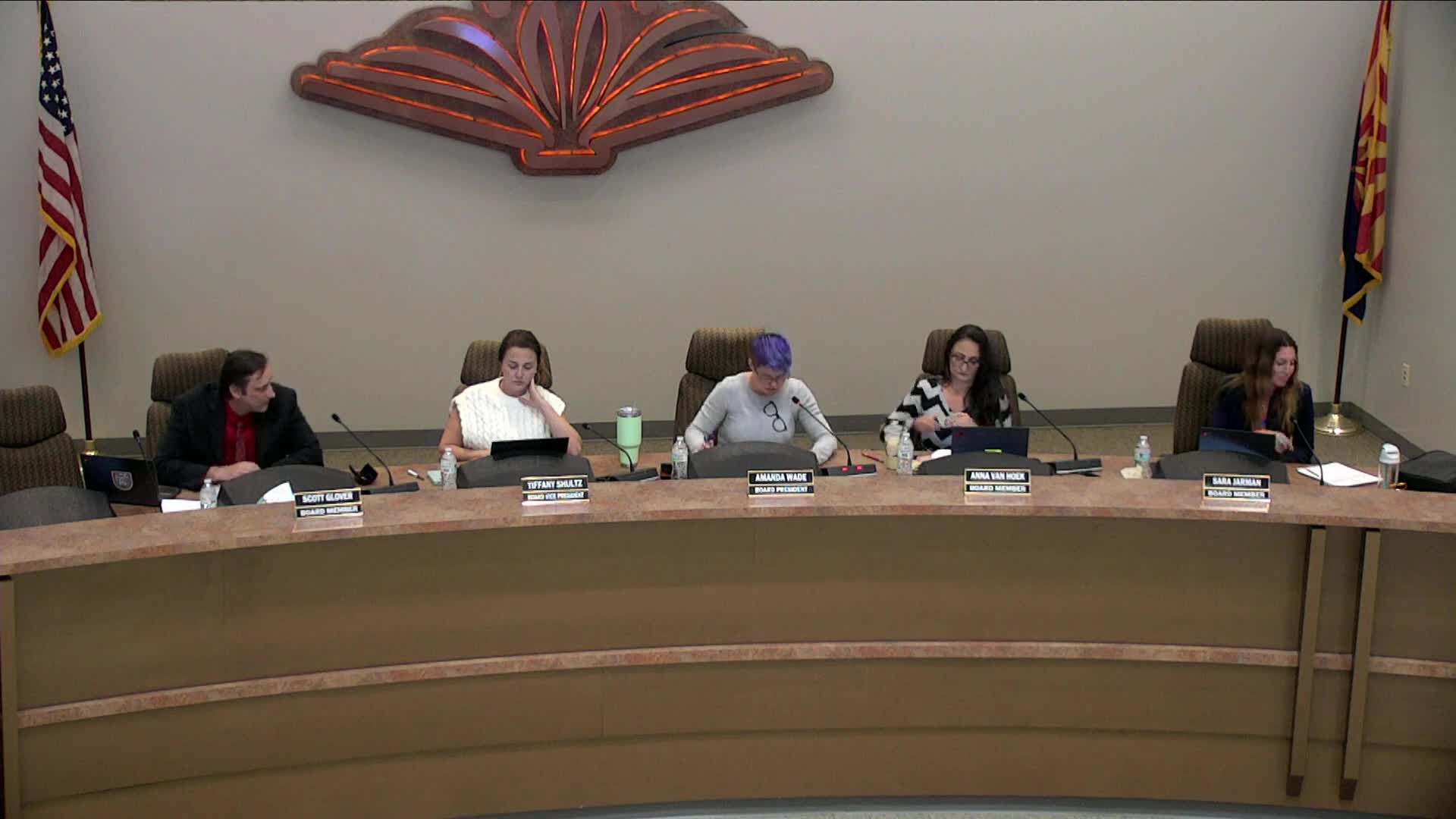Parents, teachers urge Higley board to save elementary electives as board approves classroom-site fund plan
Get AI-powered insights, summaries, and transcripts
Subscribe
Summary
At a Higley Unified board meeting, parents and teachers urged saving Mandarin and elementary electives after a failed override. The board approved a 2025–26 Classroom Site Fund allocation for teacher supplements amid debate over sustainability and transparency; multiple policies and travel approvals also passed.
Community members and teachers pressed the Higley Unified School District governing board on Nov. 18 to protect elementary electives and signature programs such as the Mandarin dual-immersion strand, while the board moved forward with several policy votes and a Classroom Site Fund plan for 2025–26.
"Elementary electives teach kids for upwards of seven years from kindergarten through sixth grade," said Thomas Murphy, music teacher at Santan Elementary School, urging the board to preserve arts, music and library offerings that he said build the foundation for later grades. "We help build that foundation for students moving forward."
Multiple public speakers — including art and music teachers, parents and a sixth-grade student — described how electives support academic growth, attendance and students' emotional well-being. Jonathan Williard, an art teacher at Higley Traditional Academy, said arts programs are "investments in student success," while parent Travis White asked the board to prioritize Mandarin and use outreach to grow enrollment and stabilize funding.
Heather Balch, who cited the district override vote results, thanked the 7,717 people who voted "yes" and defended district transparency. "Higley has been more transparent in the recent years than at any point I can recall," she said, and she described a classroom-site performance-pay plan she said had near-universal staff support.
The board took several formal actions during the meeting. After debate, members approved a Classroom Site Fund plan for 2025–26 that staff said increases the CSF supplement (the document lists a 6% figure for the CSF line item). Administrators and board members emphasized that the CSF supplement is funded from Prop 301/CSF dollars and is distinct from state-funded base M&O salaries; board member Van Hook asked staff for a multi‑year projection to test sustainability.
President Amanda Wade framed the board's approach as constrained by state funding structure. "This is how the state has maintained underfunding staff," she said, arguing the district must be creative in using available funds to support teachers.
Officials provided financial context during discussion: district staff reported the Classroom Site Fund account balance in the tens of millions, with a figure stated in the meeting of about $27,000,000; staff offered to return with three‑year projections and additional fiscal detail.
The meeting also included a sustained public exchange about transparency and campaign donations after a commenter alleged an unreported political action committee donation tied to a board candidate. Mindy Brocker said she had identified a donation from an ALA‑linked PAC that she said was not reported on required measures; the allegation was presented as a public comment and was not resolved during the meeting.
Board members approved several policies and motions during the evening: second reading approval of JLC (student health services), third reading approval of JLF (child abuse and protection reporting), designation of Amanda Wade as the district's ASBA voting representative for an upcoming bylaw vote, ratification of an expense voucher, and authorization of overnight/out‑of‑state travel for school psychologists to attend NASP. The NASP travel motion passed over one "nay" vote; staff said Title II grant funds would pay the conference costs and that attendees are briefed to avoid sessions inconsistent with district policies.
The district also heard a course‑guide presentation that proposed changes for 2026–27, including making three math-support classes pass/fail, changing an Algebra II prerequisite, and clarifying AP Capstone topic selection. Board members debated whether the course guide should flag individual courses that "may contain sensitive material" or rely on teacher syllabi and the opt‑out/alternate‑assignment process. Staff said syllabi and a process to provide alternate assignments are already in place and that adding clearer notations to the course guide could be considered before the December action vote.
The board set several future agenda items, including follow-up fiscal projections for the CSF plan, a deeper look at subgroup and root‑cause data behind A–F grade improvements, and policy work to align parental opt‑out procedures with recent case law. The meeting concluded with the board scheduling further financial and policy reviews.
Votes at a glance
- Approve evening agenda: motion carried 5–0. - Consent agenda (items 5.1–5.2): approved 5–0. - JLC student health services (second read): approved 5–0. - JLF child abuse reporting (third read): approved 5–0. - Table 2025–26 HUSD goals until December: approved 5–0. - Designate Amanda Wade as ASBA voting representative (12/16/2025): approved 5–0. - Ratify expense voucher 10.41 (includes disputed travel line): ratified 5–0 with direction for further legal/contract review. - NASP overnight/out‑of‑state travel: approved (one recorded 'nay'); staff said Title II grant funds will cover costs. - Approve 2025–26 Classroom Site Fund plan: approved 5–0.
What happens next: staff will prepare the December action package for the 2026–27 course guides, return with detailed fiscal projections and subgroup breakdowns for the A–F results, and present options or follow-up analysis on the superintendent travel reimbursement issue.
